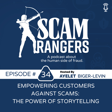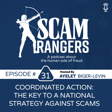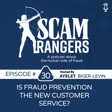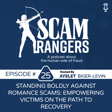
The eLegal Challenge of Online Scams - Fighting New Crimes with Old Laws - A conversation with Erin West and Alona Katz, District Attorneys and scam fighters
Join Erin West, a District Attorney from Santa Clara County, CA, and Alona Katz, a DA representing Manhattan, NYC, as they confront the pressing challenges within the legal system when it comes to combating a new breed of crime: crypto investment scams, also known as "Financial Grooming" or the notorious alias of "Pig Butchering." In this episode, they candidly discuss the complexities involved in this digital underworld, shedding light on the devastating financial and emotional toll suffered by victims. Through their unconventional thinking and innovative initiatives, Erin and Alona strive to provide solace and support to those who have been scammed, while relentlessly pursuing justice for the vulnerable.
Erin introduces operation Shamrock which is an initiative she started with the mission to EDUCATE, SEIZE, DISRUPT everything crypto scams. You can join by emailing Erin: ewest@dao.sccgov.org
Linkedin:
Alona Katz: https://www.linkedin.com/in/alonakatz/
Erin West: https://www.linkedin.com/in/erinnordbywest/
This podcast is hosted by Ayelet Biger-Levin https://www.linkedin.com/in/ayelet-biger-levin/ who spent the last 15 years building technology to help financial institutions authenticate their customers and identify fraud. She believes that when it comes to scams, the story starts well before the transaction. She has created this podcast to talk about the human side of scams, and to learn from people who have decided to dedicate their lives to speaking up on behalf of scam victims and who take action to solve this problem. Be sure to follow her on LinkedIn and reach out to learn about her additional activities in this space. Also check out https://scamranger.ai if you had received a message that you suspect is a scam



















